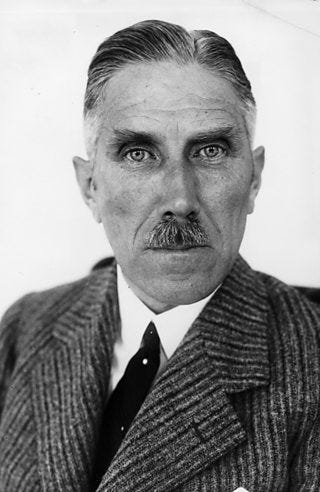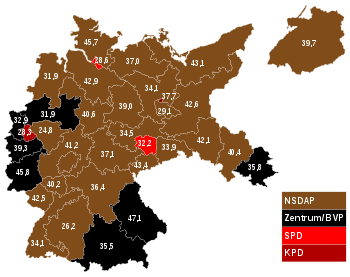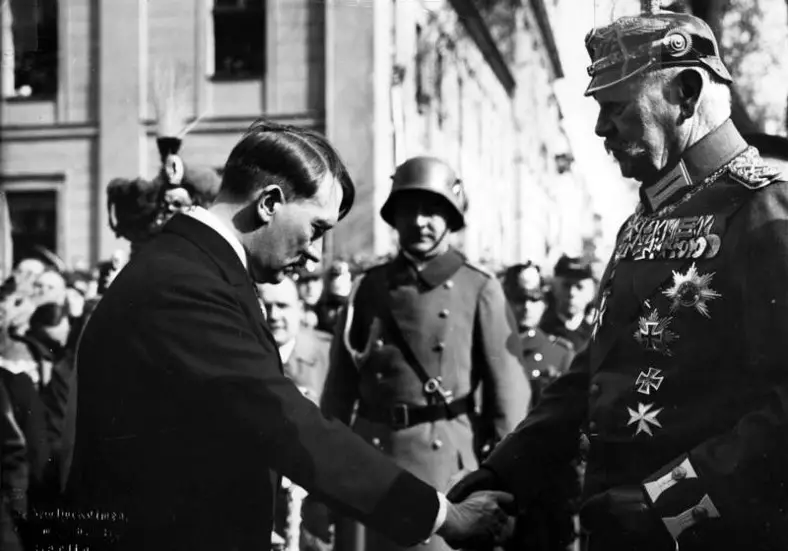 onsidered the architect of important victories on the Eastern Front during the Great War, Hindenburg became the most popular man in Germany, building a true cult of personality around him. His full name (believe it or not) is Paul Ludwig Hans Anton von Beneckendorff und von Hindenburg, the most decorated Marshal from World War I despite losing the Great War many still admire him to this day for his strategic military tactics.
onsidered the architect of important victories on the Eastern Front during the Great War, Hindenburg became the most popular man in Germany, building a true cult of personality around him. His full name (believe it or not) is Paul Ludwig Hans Anton von Beneckendorff und von Hindenburg, the most decorated Marshal from World War I despite losing the Great War many still admire him to this day for his strategic military tactics.
He was considered the perfect embodiment of German honor, fairness, decency, and power. Hindenburg’s cult surpassed all ideological, religious, regional, and class barriers, becoming the hero of all Germans, but the group that adored him most was the right-wing Germans, who considered him the ideal representative of the Prussian ethos and Lutheran values as well as aristocratic.
The Patrician and its Plebe
Hindenburg (the “Patrician”) saw Hitler (the “plebe”) as an adventurer, an adventurer who made a name for himself through the universal vote. The old marshal and the little corporal were as different as possible. While Hindenburg called Hitler, the condescending, “Austrian Corporal,” on the other hand, Hitler, less respectful, considered Hindenburg “a crazy old man” or “an old ruin,” a reactionary.
Then why did Hindenburg, who had no regard for Hitler, come to call this Nazi agitator at the head of the Chancellery?
Why didn’t he block his way to power?

The two met for the first time in October 1931 and immediately disliked one another. By January 1932, Hindenburg was already 84 years old and was eagerly awaiting the end of his term. However, he was convinced by his close friends and with the support of the liberal center and social-democratic groups to run for another term. The Social Democratic Party saw the old president as the only man who could have defeated Hitler and, implicitly, the NSDAP/AO (Nazi Political Party) in the election.
Hindenburg, as a person of order, never appreciated the manifestations of the Sturmabteilung (Nazi Police), the armed arm of the Nazi party, which was trying to impose control on the street and replace the police. Moreover, because of Hitler, Hindenburg lost re-election as president in the first round of the March 1932 election. He was indeed elected in the second round, but Hitler also obtained a significant number of votes.
The elections of 1932
Hindenburg would never have agreed to negotiate with Hitler, but his entourage did not share his position. First of all, Chancellor von Papen, at the head of a “cabinet of barons” dreaming of an institutional reform that would create an authoritarian regime, von Papen was convinced that the stabilization of the country, in crisis for three years, could be obtained only after a conciliation between the Nazis and the conservatives. He didn’t like Hitler, but he thought he could “domesticate” him.

To do so, following the July 1932 legislative elections in which the NSDAP obtained 37% of the votes, von Papen would have wanted to appoint Hitler Vice-Chancellor. Obviously, this solution did not please Hitler, who wanted with fervor the supreme leadership of the Chancellery, but neither did Hindenburg, who did not want to give in to the Nazi leader. It was the industrial media that significantly tilted the balance by massively financing the Nazi party, hoping that it would oppose the communist threat.
After fierce conflicts at the highest levels of power, von Papen was forced to resign in December 1932, being replaced by General von Schleicher who tended to marginalize the Nazis, himself practicing a kind of national-populism but focused more on the Left-wing. Hindenburg, however, faced protests from the industrial environment, while von Papen insisted that the alliance between the Nazis and the Conservatives was the only viable political solution.

Von Papen, determined to return to power, tried to reach an agreement with Hitler, although they both wanted the same position. Eventually, Papen came to believe that he would be able to control Hitler and decided to support him with the claims of chancellor. He then convinced Meißner, the head of the Presidential Chancellery, and Hindenburg’s son, Oskar and both of the close advisers to the president to help him.
1933: Hitler becoming Chancellor
Until January 1933, Hindenburg often said he would never appoint Hitler as chancellor. Even on January 26, he was saying to a group of friends, privately, the following words:
“Gentlemen, I hope you do not think I can call this Austrian Corporal Chancellor.”
Eventually, Hindenburg gives up. He agrees to call Hitler chancellor on January 30, 1933. He, knowing the sick Hindenburg is so close to giving up power did not try to assuage him, but on the contrary, left his impression (or illusion) that follows the restoration of the monarchy through the Hohenzollern family. At first, Hitler’s power was limited, given that the NSDAP had only two ministers in government, and Hindenburg’s neighbor von Papen was Vice-Chancellor and Prime Minister of Prussia.

On August 2, 1934, Hindenburg died, leaving Hitler free to combine the functions of Chancellor and President and restore the glorious German Reich. But it was not the Reich that some Germans hoped for. It was not a restoration of the Hohenzollerns and those who, naively, believed that they could control the “Austrian corporal” came to reality.
If it would have been for Hindenburg Hitler would have not had such chances of becoming Chancellor or at least not in such a short period of time. However, as many of you are aware Hitler was a different breed, a hungry man for power who would have eventually reached the status of Chancellor in some sort of way.
Avid Writer with invaluable knowledge of Humanity!
Upcoming historian with over 30 million views online.
“You make your own life.”





